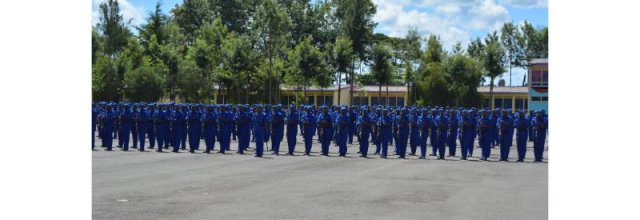This is part one, tomorrow part two about the reactions in Haiti
If you were to ask a Kenyan which government agency they have the most disdain for, the answer would almost always be the police. The police are commonly referred to as hyenas, as they view citizens as a never-ending source of revenue, similar to ATMs. In impoverished and frequently perilous communities, they occasionally collaborate with gangs, selling them weapons and dividing the spoils amongst themselves.
The police often increase insecurity, violence and corruption. According to the Missing Voices website, there have been 1,350 police fatalities and 350 abductions since 2019. “There are special units within the police that are deadly, criminal executions by these groups occur regularly,” says Joseph Kariuki Mwangi, who works at the NGO International Justice Mission. “They kill suspected criminals because the officers do not trust the courts.”
Slums
In every neighborhood, there exists a police officer who is notorious for killing suspected criminals. One such officer is Ahmed Rashid, who in 2017, shot and killed suspects who were already lying on the ground in the Eastleigh neighborhood. This incident gained widespread attention after a bystander recorded it. During his trial, which began this year, local business owners protested outside the court, hailing Rashid as an exceptional officer who had brought back law and order to their community.
In the middle Willie Kimani, the taxi driver Joseph Muiruri and right Josephat Mwenda
and the client. A tragic incident occurred a few years ago when Mwangi’s colleague, Willie Kimani, who was working at the International Justice Mission, was brutally murdered by the police. Willie was a human rights lawyer who had taken on the case of Josephat Mwenda, a poor Kenyan who had accused the police of assault. On June 23, 2016, after leaving court with his client and taxi driver Joseph Muiruri, they were ambushed and abducted by three police officers. A week later, their lifeless bodies were found in a river outside Nairobi, with their skulls crushed..
“With their deaths, caused by gangs in the police force, Kenya had reached a low point. But the incident also triggered change: because we went to court, more people dare to file charges now. We now have sixty cases pending against officers,” says Mwangi. Willie Kimani’s killers received harsh sentences. Most of the time, police killings remain shrouded in mystery. Like when forty bodies were found last year near Yola, a river in western Kenya, probably of criminals executed by the police.
Reforms are not forthcoming
Many times the government has promised to reform the police, but the abuses continued. Out of the staggering twenty thousand complaints filed in the last decade at the institution responsible for reporting police abuse, only twelve resulted in a conviction. Following the abduction of two individuals associated with presidential candidate William Ruto by the Special Service Unit prior to the previous year’s elections, President Ruto, upon assuming office, commanded its dissolution.
But even under Ruto, police behavior has hardly improved. During demonstrations, police officers shoot with live ammunition. “The biggest problem is the politicians’ interference with the police,” says Mwangi. “If the president or the minister of the interior orders the police to carry out a punitive campaign against a certain group, people will die.” For example, during opposition demonstrations in April, 17 people were killed by police bullets, according to the police, and 70 according to the opposition.
Back from Haiti as a ‘corpse’
Many Kenyans are questioning the ability of the Kenyan police to bring peace to Haiti, considering the widespread corruption and misconduct within their ranks. The fact that criminals have gained the upper hand in Haiti further raises doubts. Amnesty International, a human rights organization, has expressed its deep concern regarding the involvement of Kenyan agents in this matter.
Kenya is preparing to deploy its police officers for the first time in an international peacekeeping mission. “There are enough well-trained officers left who can do good work in Haiti,” says Mwangi. Notably, the anti-terrorist brigades demonstrate a higher level of efficiency and professionalism. Meanwhile, cynical Kenyans rhyme: However, some skeptical Kenyans cynically rhyme, “You go to Haiti and return as a maiti (meaning corpse in Kiswahili).”
This articel was first published in NRC on 12-11-2023

